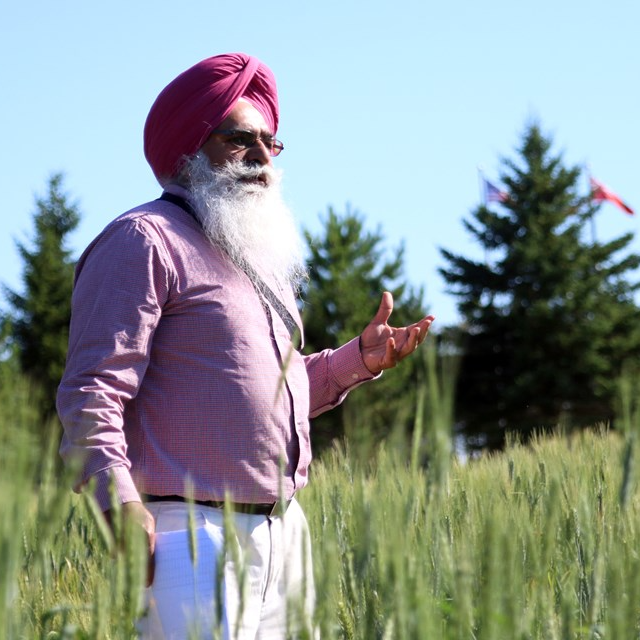Dr. Tarlok Sahota, Director of Lakehead University’s Agricultural Research Station, has won the Distinguished Agronomist Award given out annually by the Canadian Society of Agronomy (CSA).
The Distinguished Agronomist Award is presented to members of the CSA in recognition of their outstanding contributions to the science and technology of growing and using plants in agriculture for food, fuel, fibre, recreation, and land restoration. This year it was handed out virtually due to COVID-19, during the CSA’s annual conference.
“Thank you to the Canadian Society of Agronomy for this recognition and to all of my colleagues who nominated me and wrote letters of support for me for this award,” Dr. Sahota said.
“I am honoured to accept this award, which is a recognition of my work for the betterment of the farming community, and pleased to have spent many years working on soils and crops with excellent co-workers.”
In her letter bestowing the award upon Dr. Sahota, Dr. Sheri Strydhorst, Chair Advisory Committee CSA, said the Award Committee was highly impressed with his distinguished career and countless contributions to the field of agronomy through research, teaching, training and outreach activities.
“Your deep commitment to the CSA including serving as President Elect, President, and Past President, organizing annual technical conferences, serving on award committees, and receiving the 2018 CSA Fellow award, were specifically noted and are highly commendable,” Dr. Strydhorst said.
“You are an incredibly passionate scientist, who has made a substantial and wide-ranging contribution to the field through your leadership, collaborations, and deep involvement in Canadian agronomy.”
Dr. Yousef A. Papadopoulos, Research Scientist, Agriculture and Agri-Food Canada and Faculty at Dalhousie University, nominated Dr. Sahota for the award because Dr. Sahota was able to obtain his research funding on his own and lead a very productive agronomy research/technology transfer program.
He was able to lead and sustain a private research station (2004-‘18) with no guaranteed funding and was instrumental in its transition to Lakehead University in 2018, lending stability to it.
His marvelous ability to relate his research to producers’ current and future needs has been acknowledged by many organizations across the region and the country.
Dr. Sahota was able to increase farm productivity and incomes through diversification of cropping systems by introducing several new crops and crop varieties; identification and rectification of sulphur, zinc and boron deficiencies; initiating long-term experiments on tillage, crop rotations, lime and wood ash, manure and macro/micro nutrients and maximum yield and persistence in alfalfa; communicating results from these experiments to the farmers; and working on and introducing best nutrient management practices such as applying nitrogen from multiple nitrogen sources, seed row placement of part nitrogen as Environmentally Smart Nitrogen (ESN), etc.
Dr. Sahota was the first in Ontario to initiate research on ESN in field crops in 2006 and due to his research and extension efforts, Ontario farmers started applying ESN in 2009.
Prosperity on farms is quite obvious in his area of operation in Northwestern Ontario.
Dr. Tom Bruulsema, Chief Scientist at Plant Nutrition Canada, sent a letter of support for Dr. Sahota’s nomination.
“Dr. Sahota has provided strong leadership to the Thunder Bay Agricultural Research Station and has earned the respect and trust of local farmers through the dissemination of relevant agronomic information from the research trials he has managed,” Dr. Bruulsema said.
“In addition, he was responsible for seeking the funding support for this research. Without his dedicated efforts, this research would not have happened, as the research station was on the verge of closing several times.
“The fact that he managed to keep it viable, during a period when many other research stations and colleges of agricultural technology actually did close across the province of Ontario, is a testament to his commitment to the scientific discipline of agronomy. The transition to its affiliation with Lakehead University brings a welcome scientific recognition to this agronomic research work, and bodes well for the stability of the institution into the future. The farmers of Northern Ontario stand to benefit greatly,” Dr. Bruulsema said.
“The crop nutrition industry has particularly appreciated the extensive research and extension conducted on the topic of secondary and micronutrient fertilizers, along with enhanced efficiency nitrogen fertilizers.
“This work has resulted in the identification of deficiencies that limit nitrogen and phosphorus use efficiency, and has identified viable strategies to improve those efficiencies along with the productivity of the agricultural system. Dr. Sahota has provided valuable data for development of recommendations by the Ontario Soil Management Research and Services Committee,” he said.
“Northern Ontario representatives of the Ontario Soil and Crop Improvement Association have spoken to me commending the value and relevance of his research. Dr. Sahota’s research, and his numerous extension articles, have been highly valued by the Certified Crop Advisers of Ontario.
"Congratulations to Dr. Sahota for receiving this very distinguished award,” said Dr. Andrew P. Dean, Lakehead’s Vice-President, Research and Innovation.
“The research being done at LUARS under the scientific oversight of Tarlok is an important component for fostering development of the Agricultural sector for Northwestern Ontario,” Dr. Dean added.
This is Dr. Sahota’s second award in the past three years; the first one was the CSA Fellow Award in 2018. The award includes a suitably engraved plaque, free conference registration, a speaking slot of at least 30 minutes at the CSA Annual General Meeting (AGM)/Conference and up to $2,500 for travel expenses to present at the AGM. This year’s conference is virtual because of COVID-19.




